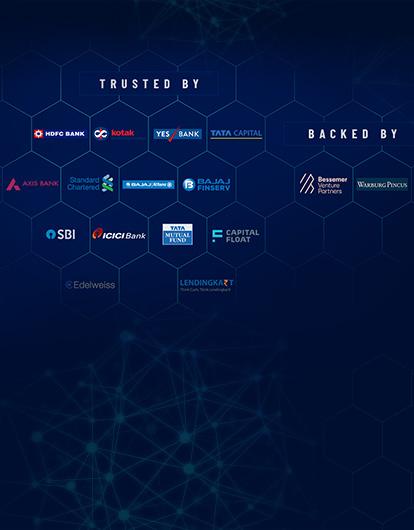
For any non-product related queries, please write to info@perfios.com.
For any non-product related queries, please write to info@perfios.com.
Small and Medium Enterprises (SMEs) are integral to the economic development of any country. They constitute the backbone of an economy providing employment and contributing significantly to the national GDP (gross domestic product). In ASEAN, SMEs account for 88.8% to 99.9% of business establishments, contributing between 51.7% and 97.2% of the total employment. In Thailand and Vietnam, SMEs account for nearly 99% of all registered businesses and employ over 70% of the workforce. In Malaysia, the figures stand at 98.5% and 66% respectively, while in the UAE, 94% of all the companies are SMEs, employing more than 86% of the private sector labour force. 

SMEs often start out with personal or internally generated funds. As the business grows, the funding is inadequate and there is a need for external financing. This is when SMEs look to banks and other FIs seeking flexible and cost-effective financing. However, bank lending to SMEs is extremely low. According to the World Bank, “approximately 70% of all micro, small and medium-sized enterprises (MSMEs) in emerging markets, lack access to credit.”
Issues that Banks have when extending Credit to SME’s
When assessing the credit risks associated with SME lending, banks have five specific considerations.
• Authenticity of an SME— The business is genuine and running.
• Business model—Whether the operating model creates value, delivering sustainable revenue and profit. It also helps to understand the background of the business owners, their competence, their skillset to run the business.
• Sustainability of the business—Is the business professional run and will survive in any given competitive landscape.
• Financial performance—The annual turnover, profitability, and cash position. This informs the quantum of the loan to be given.
• Possibility of fraud—Whether the information provided for the purpose of the loan is bona-fide and authentic.
Reviewing these factors, banks can ascertain viability of SME business and its capability to repay the loan. Banks rely on financial statements such as balance sheet, tax statements, and bank statements to gain in-depth insights into customers/suppliers/transaction levels, seasonality of a business, alternate bank accounts, and counterparty confirmation.
Lack of Accurate Financial Information
Unfortunately, this is where the complications begin. Unlike large corporates that issue transparent information about their financial and operating performance that is publicly verifiable, for SME’s generally, the information is self-declared and sketchy. Most small businesses do not maintain accurate financial documentation. Often, their tax filings do not provide a clear representation of the real performance of the business. There is information asymmetry that makes it difficult for banks to assess an SME's credit-worthiness.
To overcome this gap in information while being able to effectively underwrite the Credit risk, banks lean towards collateralised lending, where the business owner must commit fixed assets for financing. However, in most cases the business owner has already pledged or liquidated the personal assets in order to start the business.
Bank Statements as a source of truth
Across markets, Banks are now adopting cashflow-based lending methodologies, where the loan amount is determined according to an SME's actual revenue generation and the capacity to repay. To gain reliable information on real cash flow performance, banks refer to the SME’s Bank statements as the source of truth. The bank statement gives powerful insight into the health of a business- Sources of revenue generation, payments made, interest servicing in the event of any loans that the SME may have taken, overall profitability, average cash flow etc. Bank Statement can shine light on issues of Kiting, Round tripping and concentration risks associated with key suppliers or customers.
Across most lending institutions, while Bank Statement Analysis is emerging as a key method to assess SME risk, the process is largely manual and dependent on the cognitive capabilities of credit underwriter. Most bank statements for SME’s typically run into 40-50 pages and in some cases even a few hundred pages.
Perfios Insights- An AI/Machine Learning tool to process Bank Statements at scale and accurately
Gleaning information and insights from the hundreds and thousands of credit and debit narrations in the bank statements is time consuming, error prone and extremely inefficient. An underwriter struggles to deal with big data sets and this process is designed for inefficiency. No wonder, across geographies, Banks report Turn Around Times (TATs) of days/weeks, Approval Rates of sub 30%, and high fraud loss rates, when it comes to SME loans.
This is where Artificial intelligence (AI) and machine learning (ML) models are creating a big Impact. AI simply put is the science that makes computers emulate human cognitive behavior and Machine Learning is the method by which Machines learn from data. When it comes to processing large volumes of homogenous data set (in this case bank statements), Machines running AI/ML models come out being superior.
We have developed a unique tool called “Perfios Insights” that can read over 2000 types of banks statements across multiple countries, India, Singapore, Malaysia, Indonesia, Vietnam & UAE. Be it scanned images or native Pdf’s, Perfios Insights can read the bank statements and using the power of Machine Learning can deliver powerful insights associated with the underlying performance of the SME. All this happens in seconds or minutes at best.
Analysing over 2.5 million bank statements every month across countries, Perfios Insights harnesses large volumes of data to deliver accurate and granular reports on the SME's financial health helping banks to efficiently and confidently assess the SME's credit worthiness in order extend credit facilities.
Over 100 Banks and Lending Fintechs are today using Perfios Insights to process SME loan applications. Banks specifically report a 91% reduction in the time taken by a human being to process a bank statement manually. It would not be an exaggeration to say that Perfios has played a big part in changing the SME lending landscape in India, helping the Financial Institutions fund SME’s in an efficient and timely manner.
There is a big opportunity to help SME’s in many of the key emerging markets by helping them gain access to bank funding. I hope to work closely with the Regulators and the Financial Institutions across the ASEAN markets to adopt Perfios Insights and enable lending to happen more seamlessly to the needy SME’s and MSME’s.
To understand how Perfios Insights can add value to your SME-lending decisions, you can always reach out to me at pramod.v@perfios.com
Author: Mr. Pramod Veturi, CEO – International Business



